Where is New Music Headed?
Where is new music headed in 2018 and beyond? I reached out to six excellent composers and posed three simple questions:
- Where is new music headed in the next 5-10 years?
- What are the greatest challenges facing composers today?
- How can we work to address those challenges?
I reprint their replies here, unedited, and in no particular order. The purpose of this informal survey is to shed light on emerging musical paths and initiate productive conversations on art, culture, education, and everything in between.
Sincere thanks to Michael Ippolito, Reena Esmail, Angélica Negrón, Jim Stephenson, Annika Socolofsky, and Texu Kim for their thoughtful participation.
Michael Ippolito
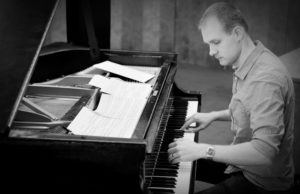
Michael Ippolito’s music has been performed by the Chicago Symphony Orchestra, Milwaukee Symphony Orchestra, and the Attacca Quartet.
Where is new music headed?
I think it is generally a fool’s errand to try to predict where music is going, but it does seem that the most significant recent trend has to do with foregrounding composers from underrepresented groups. I think it stands to reason that as we improve representation and diversity, it can only add to the range of musical possibilities. So I don’t have a specific prediction except to say that if we succeed in improving who is being heard, we should all reap tremendous benefits in terms of what creative new music is heard.
What are the greatest challenges facing composer today, and how can we work to address them?
From my own perspective as a teacher, I think the biggest challenges for young composers are practical concerns: finding outlets to get their music out into the world and finding a way to make a living. Since leaving New York and teaching in Texas, I have become much more aware of how many opportunities for composers are geographically specific. (So, part of the answer to #3 is to continue to expand opportunities – calls for scores, competitions, workshops/festivals – especially in parts of the country that aren’t usually thought of as “new music hubs” or which are open to everyone.) The question of how to make a living is always a challenge for composers, so there is nothing new there, but the more we can all be transparent about practical things like finding a day job, finding grants or other support for our work, negotiating contracts, being smart about how you file taxes and keep track of business expenses, etc. Maybe there is a natural tendency to treat this as kind of trade secrets, but composers at all levels who are willing to share details about every aspect of how they are making it work for themselves helps the rest of us learn. I am still figuring things out little by little and I certainly feel like my education, for all I learned in other areas, really failed to address those realities, so as a teacher, I try to be transparent with my students, and invite guest composers to share as much as they are comfortable with sharing on this topic.
Reena Esmail
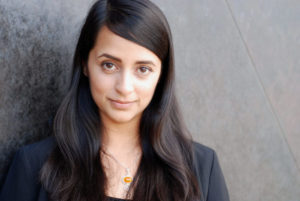
Reena Esmail, Fulbright recipient and former composer-in-residence at the Albany Symphony, is currently composer-in-residence at the Street Symphony, based in Los Angeles.
Where is new music headed in the next 5-10 years?
Perhaps this is just the world I am living in right now, but I feel that as more voices are being valued, and also as our world is growing increasingly interconnected, there are trends towards valuing music that is outside of the Western classical canon, and composers are drawing that into their music. This can be popular music, music from other cultures, jazz, etc. Western art music is uniquely suited to embrace so many other forms within its context. Notation allows musicians a way into many other forms, and now with other media such as audio and video recording, a score isn’t limited to paper, which makes it even easier to engage with non-notated traditions.
What are the greatest challenges facing composers today?
Relevance. Western art music as it is taught in conservatory feels increasingly irrelevant in the larger context of the music world. Conservatory training needs to be supplemented — most composers I work with have never written for musicians who can’t read Western notation. Furthermore, the ideology that the ability to read that notation is the backbone of all musical literacy needs to be challenged. Western art music has not been the center of the music world for over a hundred years, and I think we need a radical shift in perspective, and a humility around embracing the other incredibly sophisticated types of music that exist around us. I think composers are truly starting to see this and the work is shifting accordingly already – especially among the youngest working composers, in their early/mid-20s.
How can we work to address those challenges?
There needs to be greater diversity in university faculties. And not just a cosmetic difference. I say this as a brown woman who has been trained in schools with almost all white men – my training has been about preserving the hierarchy. And that is not what we need. We need people who are well versed in other musical styles, who come from other cultural, race and class backgrounds, who come from other educational systems. Who don’t know how to fit in to what already exists. They are the ones who will change things. We need to hire people who challenge our long held beliefs about what concert music is. People who are from communities where access to arts education is not a given. This is the diversity I’m talking about.
I also think we truly need to pay attention to the youngest composers among us. They have such a broad perspective and are searching for their place, not only in the musical world, but in the world in general. They are not afraid to speak their truths, whether it’s about their own work, or about social issues affecting them and their communities. And frankly, they see that injustice more clearly because of the world they’ve grown up in. The youngest generation of composers just blows me away constantly. I hope I can continue to use my voice to amplify theirs.
Angélica Negrón

Composer and multi-instrumentalist Angélica Negrón has composed for the Albany Symphony, Bang on a Can All Stars, MATA Festival, the American Composers Orchestra, and many more; her film scores have been heard numerous times at the Tribeca Film Festival.
Where is new music headed in the next 5-10 years?
I hope that towards inclusivity so that we can hear many more different voices that we’re missing out on at the moment. I hope style and genre lines will become even more blurred and concerts reflect on stage and off stage the diverse world we live in.
What are the greatest challenges facing composers today?
Letting go of academic “standards” for what composing means and being true to your artistic voice. Also resources for being able to have a sustainable career as a composer as well as opportunities to present their work in contexts outside of new music circles.
How can we work to address those challenges?
More music composition education programs starting at an early age exposing children to many different ways of exploring music making (not limited to notes on a staff). Composing being as essential and common in schools as drawing and painting. Organizations and programmers being intentional about listening to all voices and not just those that we’ve heard over and over again.
Jim Stephenson
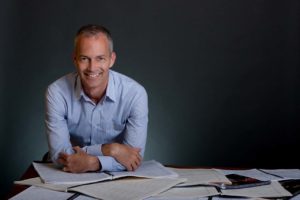
Jim Stephenson’s Bass Trombone Concerto will be premiered by Riccardo Muti and the Chicago Symphony Orchestra in June 2019.
Where is new music headed in the next 5-10 years?
I think “new music” will always be trying to figure itself out. And all of that figuring eventually ends up in an “era”. There is no doubt that the influences from around the globe that are now instantly available are affecting the sounds we are hearing. So – there is a chance that regional “sounds” could start disappearing. Or perhaps a better word is “morphing”. We are ALL borrowing from each other. I think this could be bad and good. What Bartok did with folk songs, or John Lennon with Indian music, is now only a click away. I hear separate “camps” of experimental music, and more “accessible” music – which has probably always been the case. But we’ll see where all of that goes.
What are the greatest challenges facing composers today?
The market is now getting super-crowded. Almost anyone can be a “composer”. And everyone will struggle to get their voice heard. So, it will be a constant challenge for composers to get past the gates and into the hands of the powers-that-be that make decisions. Granted, the mechanisms for doing this have also been simplified tremendously, with online sharing. The temptation is to overhype one’s self – in an effort to be noticed – but this is a short-sighted plan. One shouldn’t mistake social media attention (i.e. lots of “likes”) for connecting with difference makers. Self-publishing, though still having its rewards, is still a challenge. Composers (at least for now) still have to have a lot of patience, as longer-standing publishing companies still have the upper-hand in promoting composers. It’s always a struggle for composers to promote themselves, so it requires patience to wait and hope that others will do the promoting for you.
How can we work to address those challenges?
There is no substitution for hard work, and for being a decent person. There are NO short-cuts. So – any composer at age 21 thinking that they might write one piece and the rest of their life will be set, must really and truly think about that. One must be ready to be in this for the long haul – and to LOVE doing it. Because there will be difficult times. If it feels like a “job”, then perhaps it isn’t what one should be doing.
Always remain CURIOUS, listen to a lot of music, attend events where you will meet people, and be patient, and WORK HARD. If you can do other things like creating a website, videos, great audio clips, press-packets, etc. (none of which I can do), you are ahead of the game. Also, cold-calling pretty much NEVER works. One must build relationships, which sometimes takes years, or even decades.
Annika Socolofsky
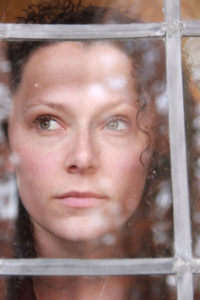
Composer and vocalist Annika Socolofsky, recipient of the Fromm Foundation Commission and a BMI Student Award, has collaborated with the Albany Symphony, Rochester Philharmonic, Knoxville Symphony Orchestra, Eighth Blackbird, and Third Coast Percussion.
Where is new music headed in the next 5-10 years?
It seems to me that the younger generations of composers today are rather unsatisfied with characteristics that have defined “new music” for so long: all those academic degrees, the dense string quartets, the homages to canonical repertoire, the elitism, and the inability to truly collaborate with musicians from other traditions. Younger generations are writing from the place of the music they love, which is just as often Ligeti or Saariaho as it is tUnE-yArDs or Kendrick Lamar. The result is that new music is increasingly more diversified in aesthetic, style, genre, and medium. And this inclusivity of genre has the potential to make new music more inclusive of race, class, and gender. It’s my hope that new music will become less dependent on academia, and more accessible to all.
What are the greatest challenges facing composers today?
I think there are two categories of challenges facing composers today.
- The same challenges composers have always faced: how to create and contribute something new to the world, how to move people through music, how to remain relevant, how to help along dialogues of the time, how to create and evolve over a lifetime, how to make money.
- Recognizing that the beauty of our music alone may not be enough to help the world—that we may need to be more than just musicians in today’s political (not to mention natural) climate. This is especially apparent when we look at how limited the demographics of our audiences are.
How can we work to address those challenges?
My personal answer to the first group of challenges is to always make music that is honest—honest emotionally, honest with myself, and honest about myself with others. I don’t believe it’s possible to make good music if you’re trying to sound like someone or something that you are not. In this regard, I really only have one job as a composer and as a vocalist, and that is to be myself. No one in the world can be me better than I can be me. Finding my truest self is 98% of the battle.
For the second group of challenges, I think means a multitude of things: to mobilize, to build community through music, to teach, to help foster dialogue, to help others process grief and pain, to entertain, to celebrate, and to never say nothing.
For me, this last point is most important. There’s this Bernstein quote that is so often used to validate musicians sticking to the status quo (“This will be our reply to violence: to make music more intensely, more beautifully, more devotedly than ever before”). But I think this quote falls very short of our potential as artists. Our reply to the violence of and to this world isn’t to keep making the same beautiful music more beautiful—that’s not actually a reply. That’s just not enough. Our reply to violence should be to reply through our art—to say something that has to be said.
In short, our biggest challenge is our easiest challenge: never say nothing.
Texu Kim
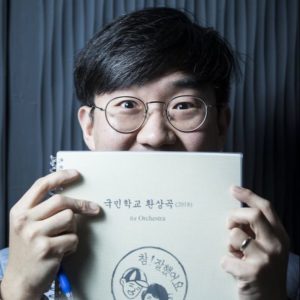
Recipient of the SCI/ASCAP Commission and Isang Yun International Composition Prize, Texu Kim has collaborated with the Minnesota Orchestra, Seoul Philharmonic Orchestra, Alarm Will Sound, and Ensemble Intercontemporain.
Where is new music headed in the next 5-10 years?
I think it is heading to “blurred boundary.” It has been already, among genres, between composers and performers, among mediums, and among venues.
Classical composition has incorporated other genres, including commercial music and other art music (from various cultures). It has been in that way for a long time, but has not gone to the other direction. So, I think it is safe to say it will go to that direction for at least another decade. In the same way, music by more diverse composers have been and would continue to be heard, including the recent Philadelphia Orchestra’s commissions for female composers and ACO’s Ear Shot programs for African-American composers.
A lot of great composers have been performers themselves, but the role as a composer, in many cases, was separated from their lives as performers. Thanks to the influence of rock, jazz, and pop music, where collaborative creation is more widely appreciated, “Classical” music will also have more and more performing artists who simply create their own music.
Technology has been an important tool – and it is almost a standard expectation for composers today to be capable to adapt it in multiple ways. Music has been for multimedia for a long time, again, and the new music will be accordingly under the rapid evolution of technology itself. For example, AI will be a significant issue in 5 years, and VR 10 years – totally my gut says!
More and more “unconventional” venues are being used as a place for new music concerts. And since such a tendency in Classical music has only a short history yet, I assume it will go in that direction for a while from now on. And, VR concert hall, again will be a significant one, in my opinion.
What are the greatest challenges facing composers today?
For me, at least, the most concerning thing is the increasing lack of education of Classics (and the culture that nourishes the simple anti-authenticity: I am not talking about particular type of canons but in academia, we deal with many students who major in music but cannot name 10 composers…). Not to be the grumpy professor, but I am worried because the accumulated history and repertoires have been a distinction and prestige of Classical music, which is going to be challenged.
On the other hands, there are so many interesting music that are being created, overwhelming new music composers, performers, and lovers… So it has become more about “what I know,” though we all have the pressure that we have to know everything that is going on, which will be more and more possible. The criteria of good music will be diversifying dramatically, which will make it more challenging for the musicians to find out their right audiences and to meet the expectation satisfyingly.
How can we work to address those challenges?
This, I am not even sure if this is even what composers solely could do. But the society should change and the educational system should be improved, basically, to value the art of learning more. East Asian countries have had a benefit when they encountered the ideal of the Western education and they had governments powerful enough to push forward to the “right” direction (quite ironic). This has resulted in the growth of a Classical music market in East Asia, as we can easily observe. Different countries (and states) should approach this issue differently, so there is not a universal answer, but at least to create more inclusive and higher-quality education would be one of the keys.
copyright 2018 Teddy Niedermaier; no reuse without permission